#koker trilogy
Explore tagged Tumblr posts
Text
'In his 1987 Nobel lecture, Joseph Brodsky said, anthropologically speaking, a human being is primarily a creature of aesthetics, and only after, an ethical one.
This assertion sounds true in the case of J. Robert Oppenheimer. The scientific leaps in the field of quantum physics fascinated Oppenheimer. He was driven to follow the path of Niels Bohr and Werner Heisenberg. Returning from Cambridge to expand his research in Berkeley, he fell into the arms of the American state and became part of the Manhattan Project to develop an atomic bomb.
It is comic irony that Lewis Strauss, who secretly plotted against Oppenheimer, was forced to work as a shoe salesman during the recession, while Oppenheimer achieved the distinction of Edward Teller calling him, “the great salesman of science.” This explains the moral turn in the life of Oppenheimer. Christopher Nolan likened his character to the titan Prometheus, though midway he seemed to metamorphose into Frankenstein. The hamartia of Oppenheimer’s life, Aristotle’s term for the Greek tragic hero’s fatal flaw, turned into a modern horror story.
The poet Joseph Brodsky’s distinction becomes relevant at this point: Oppenheimer abandoned the moral for the aesthetic. My scholar friend (who wishes to remain unnamed) shared the opinion that Oppenheimer, initially lost in the beauty of pure theory, transforms that aesthetic obsession into a monstrous one. She added the sharp insight: “Oppenheimer tells himself a lie. That the bomb has a moral end.” The act of lying to oneself produced a psychic wound within Oppenheimer. He lost sight of the moral aspect within his aesthetic pursuit. The lie made the transformation possible. The sublime beauty of studying quantum physics was ruined the moment Oppenheimer decided to use his expertise for a detrimental cause.
The sale of his scientific skills to the American state for making the bomb had a clear political objective for Oppenheimer: to finish off Hitler. This logic led him to overcome the moral dilemma behind his job. Any force that can destroy evil is legitimate. The destructive power of science was a seductive option to nullify the power of fascism. The Jewish Oppenheimer did not have his revenge over the Nazis (who were already defeated when the bomb was ready). The American state used it against a weakened Japan to declare its omnipotence.
Young Oppenheimer’s interest in T.S. Eliot’s ‘The Wasteland’ and the Gita has a deep connection: Eliot’s poem ends by evoking the Upanishad, “Shantih shantih shantih”, a peace of the grave that fell upon a world torn apart by the end of World War I and the flu epidemic. Oppenheimer’s translation of the line from the Gita, “I am become Death, destroyer of worlds” was what Krishna said about his divinity being time itself that destroys the world at will. It was meant to exhort a weak-kneed Arjuna (who did not want to kill his cousins, seniors and kinsmen), reminding him of his duty as a warrior to prepare him for battle. The figure of divine incarnation and warrior-prince got fused into the scientist who invented a weapon that could kill millions.
Oppenheimer’s interest in the evocative moments in the two texts shows a certain death wish he carried within himself. When you are hell-bent to destroy the enemy, you are also out to kill a part of yourself through the act of retributive justice.
Oppenheimer was not able to distinguish between the ethical difference between annihilating a system of power and annihilating people. This failure, however, is an intimate part of the modern West’s history. It produced ideas of the state – fascism, communism and imperial democracies – where the other within and outside one’s ideological fold was demonised as the absolute enemy and was meant to be exterminated. Making the bomb to be used for war, Oppenheimer not just used science as a tool for destruction, but created an ideology of science as divine power that could kill uncountable numbers of people as much as it could heal the world.
It has been acknowledged that Nolan did not glorify war by not showing the bomb being dropped on the two Japanese cities. Still, as my scholar friend pointed out, Nolan could not prevent himself from indulging in Hollywood’s fetish for spectacle. There was a clear lack of self-restraint. The slow-motion explosion of the bomb that filled the screen numbed the audience, and engulfed it into the terror of its silence.
Contrast it with Abbas Kiarostami, who did not display the earthquakes that rocked Iran in Koker Trilogy in order to portray its psycho-social repercussion on the lives of residents who suffered its impact. Kiarostami’s art of filmmaking is deeply informed by his ethical hesitation.
Nolan had more reasons to hold back from depicting the technological grandeur of an instrument of death. The temptation to recreate the spectacle is not simply an aesthetic flaw.
The euphoria of the scientific feat was viscerally exhibited by bodies of people stomping the floor of the hall celebrating Oppenheimer. It announced the coming of a new crowd in world history that took nationalist pride in mass destruction of other people. Oppenheimer looked conflicted, remorseful and eaten by guilt. But there were no indications to suggest he completely regretted his success. Truman, embodying the masculine pragmatism of the American state, lampooned Oppenheimer as “crybaby”. No one cared about the real babies in Hiroshima and Nagasaki. Such is the moral indifference of war. It causes deafness of the soul.'
#Abbas Kiarostami#Koker Trilogy#Christopher Nolan#J. Robert Oppenheimer#T.S Eliot#The Waste Land#Bhagavad Gita#Niels Bohr#Lewis Strauss#Werner Heisenberg#The Manhattan Project#Hiroshima#Nagasaki
0 notes
Text
THROUGH THE OLIVE TREES:
In meta drama
Tea man tries to court actress
While acting in scene
youtube
#through the olive trees#random richards#poem#haiku#poetry#haiku poem#poets on tumblr#haiku poetry#haiku form#poetic#criterion collection#abbas kiarostami#Hossein Rezai#Koker trilogy#Youtube
1 note
·
View note
Text
'Where Is the Friend's House?' – Abbas Kiarostami's first childhood odyssey on Criterion Channel
Where Is the Friend’s House? (Iran, 1987), Iranian master Abbas Kiarostami’s first and most conventional dramatic feature, is an odyssey of sorts, a sweet and simple story of childhood in rural Koker. Ahmed (Babek Ahmed Poor) is a schoolboy who discovers he’s accidentally taken home his buddy’s homework assignment. Against the express orders of his mother he rushes off to a nearby village to…

View On WordPress
#1987#Abbas Kiarostami#Babek Ahmed Poor#Blu-ray#Criterion Channel#DVD#Iran#Koker Trilogy#VOD#Where is the Friend&039;s Home?
0 notes
Note
do you have any movie/book recommendations? your taste is impecable
thank you for flattering me, i'm honored that you think so!!
i really just started watching movies (insofar as this is possible) so my recommendations are limited but i adore july rain, it's free on youtube in high definition. it's fantastically shot, i find it comforting and uplifting in a deeply sincere way. angel's egg is far and way the most stunning animated film i can imagine. mirror is visually and textually so dense it's remarkable. i watched the koker trilogy recently and they were just a joy to watch, really beautiful and so diligently made, at the same time incredibly simple and complex
i put links to the letterboxd pages so i can spare you me trying to describe the plot/synopsis of a film hehe
as far as books go... i really like platonov, i recommend reading one of his short stories (maybe among animals and plants) and if you connect with his writing style, read happy moscow, the foundation pit, or the collection of his short stories (usually published with the novella soul, which is not one of my favorites honestly)
i also love elizabeth bishop's poetry, my entire soul is located within the stanzas of at the fishhouses. i recommend one of her collected works
anyone, please send me any movies or books you've read and appreciated lately, i'm happy for anyone to share their recommendations!!
69 notes
·
View notes
Text
Maura Delpero nella videoteca di Criterion Collection. La regista di “Vermiglio” sceglie
“I fidanzati”, “Il posto” e “L'albero degli zoccoli” di Ermanno Olmi;
“Koker trilogy” di Kiarostami;
“La pianista” di Haneke;
“The Piano” di Jane Campion;
“Fish Tank” di Andrea Arnold.
4 notes
·
View notes
Text
~10 (give or take) blorbos, fandoms, tags
In reverse order from present day to childhood: Kerr Avon - Blake’s 7 Gerald Tarrant - Coldfire Trilogy by CS Friedman Aaravos - The Dragon Prince cartoon Iorveth - The Witcher 2 videogame Gascon Brossard - Thronebreaker videogame Don Simon Ysidro - James Asher novels by Barbara Hambly Lestat - Anne Rice’s vampire novels Methos - Highlander TV series Old Shatterhand - Winnetou by Karl May Zorro - Kaiketsu Zoro anime Shredder - Ninja Turtles cartoon series
A lot of these are good bad boys, or villains with a heart. Many have some hidden dark past or secret identity. They often look elegant, swift or graceful rather than bulky; their strength tends to lie in their mind more than their body, and insofar as they’re physically strong, it’s in a way that makes them look like a figure skater rather than a wrestler. They’re all brilliant and very competent at what they do. They tend to have a certain wisdom in the way they see the world, delivering unexpected and often sarcastic insights, but with a sweet bitterness that hints at a sensitivity they are trying to hide.
Thanks for the tag @myblacksailstales Tagging with no pressure @theobscurepotato @bertilakslady @first-and-last-neocount @aretuzagradschooldropout @alter-koker @witch-and-her-witcher @vigil-of-the-red-waste @sarasade @zzzett @marnasid @she-who-drank-vodka-with-cats @between-thepages and anyone else who wants to join.
13 notes
·
View notes
Text
hoping to watch the koker trilogy by abbas kiarostami next
2 notes
·
View notes
Text
Writing Initiative № 04
Describe 2–3 specific strengths your classmates found in your work and their reasons for identifying them.
After explaining my overall project structure using the visualization I made, detailing the chronicles of Mlle G and her travels, and describing my plans to have my next alter-ego start off by referencing her project, my peers were very excited.
To summarize, (in the current iteration,) Mlle G. taxonomizes all her photographs from around the border of Crimea into 4 classifications: A, Land at the Horizon; B, Liminal Horizons; C; Bodies in Space, on Land*; D, Liminal Bodies. (TLDR: landscape -> distorted landscapes -> people in the landscapes -> distorted people). My 3D project, moving up a strata of abstraction, is focused on the interpersonal borders of body and skin; so this alter-ego's fiction will begin by them finding the artifacts of Mlle G's project, her collection of photographs/writing on bodies at borders and liminal bodies, and beginning their study with that. At present, my running idea is to recreate the study of this alter-ego (their desk/workspace), and to have Mlle G's artifacts present on it, amongst other things...
*I want to change this classifciation name to Bodies at Borders ...
Aiyana was really intrigued by this premise of the subsequent project building off the world-building from the last. This interlacing, reflexive, self-aware mode of fiction reminded her of The Koker Trilogy by Iranian film director Abbas Kiarostami: Where Is the Friend's House? (1987), Life, and Nothing More... (a.k.a. And Life Goes On, 1992) and Through the Olive Trees (1994). I've only seen the first of these 3, but from the way Aiyana described it, I knew it was amazing. Here is the very brief breakdown from Wikipedia:

This was a great reference to receive moving forwards; I can't wait to update my blog with my thoughts. (perhaps I will screenshot my lettrboxd review and post it here...) On another note, Celine also commented on how she thought the characterization of Mlle G. was very well written and endearing; albeit, not entirely a testament to my writing, as it was re-contextualized (bootlegged) from Baudelaire's essay. Based on descriptions like "...carries originality to the point of shyness...", she mentioned how it's "such a wonderful way to describe someone". Anyways, to summarize; my peers thought my structure visualization, interlaced world-building between my alter-ego's/project stages, endearing characterizations were strengths I had established thus far.
Describe 1–2 specific ways your classmates thought you might refine or improve your piece going forward.
My peers supported my plans to make more visualizations to provide clarity for the structure of all these interconnections within my projects. This is something I was keen on doing already, given the personal satisfaction (of clarity) of my overall structure visualization.
How might this feedback inform your thinking/making going forward? Describe 2–3 specific ways your classmates have informed how you might continue with one of the other assignments (3D, 4D, Reflective Piece) through Reading Week and to be presented next.
My peers heavily endorsed the idea of my 3D project being a physical set-up of the study/work space of my next alter-ego. Amidst our conversations, we were floating around the idea of potential collaborations (Aiyana and Sanchari, for example are both interrogating body for their projects as well). In reflection, I was thinking; perhaps the collaboration can be as simple as their 2D artifacts being present in the workspace of my alter-ego, as if this person referred to Aiyana's photographs or Sanchari's diagrams as a part of their research... So, moving forwards, I'd like to get started with my 3D alter-ego, decide who they are and what they do, and see what connections and collaborations can emerge...
0 notes
Text

Movies I watched this week (#181):
“It’s a pity we haven’t got a bit of rope..”
Prompted by the HootsMaguire's essay, I was reminded that I’ve never seen Waiting for Godot (2001). Beckett's absurd play is so fantastically original. Two shabby fellows, confused, belligerent and forgetful, argue with each other for 2 solid hours, without making any sense or connection. Two other odd characters appear, a master and his slave, and then a laconic messenger boy. But everybody's memories are definitely defective, and they must repeat everything again and again - not that it helps. And the allusive Godot of course never appears. (Photo Above).
So what the heck does it all mean? I haven't got a clue, but it's mesmerizing. 9/10.
🍿
The 2 last parts of Abbas Kiarostami‘s ‘Koker Trilogy’:
🍿 I don't know why I waited so long to watch these two movies, since I loved his first entry 'Where Is the Friend's House?'.
And life goes on (Also called 'Life and nothing more') is a simple but clever semi-documentary meta-film. In 1990, a devastating earthquake killed 50,000 people in a remote Persian area. A filmmaker brings his son with him on a trip to the destroyed village which was the location of his previous film. They want to check if any of the kids from the first movie survived. Like most Iranian movies I've seen, the cars are old, barely moving jalopies, and the deafening noise from street traffic stands out as another character of the story. 8/10.
🍿 Through the Olive Trees Goes Meta one level up. It's a lovely continuation of the 2nd chapter, peeling a 'Day for night' onion of 'how it was filmed' in a primitive village settings. Recreating the memorable terrace scene and adding a maybe-true, maybe-fiction story of the boy and girl who played the newly-wed. Beautiful rendering with a sad, sad final shot that last for a long time, and doesn't offer clear explanations. And everything is permeated by death and destruction. 9/10.
🍿
2 documentaries by Todd Douglas Miller:
🍿 “… Houston. Tranquility Base here… The Eagle has landed…”
Apollo 11 is an exhilarating 2019 re-telling of the moon landing. Perfectly crisp and emotionally laid out, without any bullshit narration, talking heads interviews or irritating recreations. Just jaw-dropping photography which puts you in the middle of the action. And the display of massive technology is overwhelming: Thousands of engineers and scientists who had built such an inhuman infrastructure (and where each bolt and wire must work 100% of the time!) - 10/10.
On July 20, 1969, I was a 15-year old, arrogant prick, who refused to respond to anything that was shown on TV, so instead of watching the actual event 'live', I ignored it, taking a stroll in the night streets and pondering my miserable life. What an insufferable idiot I was! (And probably still is).
🍿 Miller's earlier docu-drama Dinosaur 13 however, was a huge let-down. A fascinating start about the South Dakotan paleontologists who unearthed the "Sue" skeleton, turned into a standard 'True Crime' melodrama. Full of dull reenactments, wall-to-wall musical score that tells you how to feel, boring interviews where the characters sit and emote while recalling every step of what happened, fill-in visuals, obvious narrative... Disappointing!
🍿
3 by Romanian Adrian & Claudia Silișteanu:
🍿 The Ditch (2012), a terrific rustic comedy about a peasant who has to dig a ditch in front of his house, and like Tom Sawyer, would rather hide in the barn and drink while letting somebody else do the labor. 8/10.
🍿 Written / Unwritten (2016) is another unexpected drama about unpredictable, ungovernable and very loud gypsies. A baby is born, and the nurse needs to fill out the correct paperwork in order to release her. Best film of the week!
🍿 The Afghanistans (2019) is very different. It starts with a soldier trying not to be shot, and develops into an intricate power play of government, bureaucracy, refugees and hard negotiations.
I would watch anything else these 2 will produce!
🍿
Raffaello Matarazzo was a successful Italian director, in the days before Neorealism. His Tourist Train (1933) is the first comedy from the Fascist era that I’ve seen. But it has no political elements. Just a lovely trip into the Umbrian countryside by a group of middle class people, and their light adventures by the river in Orvieto. Nino Rota’s first film score. 6/10.
🍿
Hollywood's depictions of the deep South X 3:
🍿 Rich Hall's The Dirty South, my first by comedian Rich Hall, a tongue-in-cheek documentary for the BBC, about how Southerners were portrayed through the years by the movies, from Li'l Abner and Rhett Butler to 'Your cheatin' heart' and Burt Reynolds. 'If you needed Hollywood to tell you about these musicians, then you're a grazer. Fuck you.'
Next on my list: His entries about American 'Road movies' and 'Westerns' genres. (Thanks to u/jupiterkansas.)
🍿 "What we've got here is failure to communicate."
Peak Paul Newman as Cool hand Luke, a rebel without a cause, another Randle McMurphy sentenced to an institute that will do everything it can to break his freewheeling spirit. Self-destructive, anti-social nihilist, sticking it to the Man, until he can no more. Good old Chain-gang romanticism, lays it thick: When he finished eating 50 hard-boiled eggs in one hour, he's left laying like a crucified Jesus on the table, a beautiful, bare-chested specimen. 💯 score on Rotten Tomatoes.
🍿 Baby Doll was another scandalous Tennessee Williams / Elia Kazan tale of unconsummated desire. Sweaty failures tearing each other down. A sexually-frustrated, boozy husband losing his gin-cotton business. A 19-year old virgin Lolita, who doesn't realize the effects she has on all men around her. Eli Wallace in his first role as a hot Sicilian lover-type, bent on revenge. Two black share-croppers acting as a Greek chorus. No wonder The Catholic Legion of Decency boycotted this 'filth'.
🍿
Unrelated, my first film by Joanna Hogg, which was also her debut feature. A British woman escapes some marital issues by staying with friends at a villa in Tuscany (which was nice). The film is highly-acclaimed, but I found the whole story dull and un-engaging. [*Female Director*]
🍿
"Never sweep the place where you live. Because after four years, the dirt doesn't get worse!"
An Evening with Quentin Crisp is my introduction to the controversial gay iconoclast, English raconteur and witty performer. The YouTube copy is of low-quality, but the content is 'Marvelous'.
Next: The two movies based on Crisp’s work, with John Hurt playing him, 'The naked civil servant' and 'An Englishman in New York'. (Also, a deep dive into John Hurt’s meatiest roles!).
🍿
Brat Pack X 2:
🍿 I haven't seen nearly any movies from the 'Brat Pack' universe, and wasn't vested in any of the actors' careers. So Andrew McCarthy's new autobiographical documentary, Brats, didn't carry any nostalgic resonance with me. It's also about the pervasiveness of pop culture television from the 80's, which was even less interesting. But his pained journey of discovery felt unexpectedly honest. He used this film as a form of personal therapy, which is Okay, I guess. I also didn't realize that this was the first time when Hollywood zoomed in its focus on teenagers and the young, and that these actors were elevated to carry the money torch. 7/10.
🍿 So I thought I'll try some of these '80s classics I had missed out on. Unfortunately, I started with Class (1983), which was Rob Lowe's 2nd film, as well as the debut of McCarthy, John Cusack, Virginia Madsen, and Lolita Davidovich. Badly-remake of 'The Graduate' with cringy prep school tropes was a second rate sex comedy. Couldn't finish it.
🍿
Roger Corman's horror-comedy Bucket of blood taking place in a late-'50s counterculture scene, where phony "Bohemians" and "Beatniks" and "Artists" are fawning over the busboy's macabre clay sculptures. "I love everything about Roger Corman except his films..."
🍿
A bunch of shorts from all over:
🍿 Rain Town, a beautiful, calming Japanese fairy tale about a little girl in a yellow raincoat. With the spirit and soul of Ghibli magic. 7/10.
🍿 How a bicycle is made, a short British Council How-To film from 1945. Impressively primitive.
🍿 Neighbours, my first by Canadian Norman McLaren. An anti-war stop-motion parable which won the Oscar in 1953. The Coen Brothers must have seen it before making 'A Serious Man'.
🍿 Daybreak Express, D. A. Pennebaker first film from 1953. Set to a Duke Ellington tune. Jazzy and poetic, nearly abstract. 7/10.
🍿 Dead End, another fantastically-nihilistic nightmare from Victoria Vincent about a depressed school counselor and even more desperate youngster. 9/10. [*Female Director*]
🍿 He starred in 200 movies, and many of them were 'Bad'. Still, he never won an Oscar. Now that The Don is gone, what should I watch in his memory? One of the great ones I've already seen ('Don't look now', '1900', 'Klute', 'Casanova', 'Invasion of the body snatchers') or one that I haven't ('The dirty dozen', 'Kelly's Heroes', 'Buffy the Vampire Slayer, 'Cold Mountain')?
So meanwhile, here's Cloudbusting, where he plays Orgonomist Wilhelm Reich and Kate Bush plays his son. [I like the song more when it was used at the climax of 'Palm Spring' though.] RIP, Donald Sutherland!
🍿 Look at life, George Lucas very first experimental film, made in 1965, while he was still a student at USC, and heavily influenced by Canadian Arthur Lipsett. Found at a new in-depth analysis of the Brainwashing Film within Film from Pakula's 'The Parallax View': A must-read for anybody who loves the 'Paranoia Trilogy'!
🍿The F-Word, A Father-Daughter Swearing Lesson, from The New Yorker. A riff on the old 'What The Fuck!' The English Language's Most Versatile Word.
🍿 The Letterboxd Oscars: Some guy edited a 32 min. YouTube video, comparing all the Best Movie Oscar Winners to the list of Letterbox highest-rated movies from each year. In 94 years, only 10 were the same for both. Obviously, today's user base of Letterbox skews international, and loves their auteurs.
🍿 Passionless Moments (1983), 10 tiny vignettes about the secret life of random thoughts. An early short from Kiwi director Jane Campion. [*Female Director*]
🍿
2 tobacco-related movies:
🍿 The Stolen Jools (1931) which crams cameos by no less than 55 then-stars into a 20 minutes mystery plot. Everybody from Gary Cooper and Our Gang, to Irene Dunne and Maurice Chevalier. It was a charity project to raise funds for a Tuberculosis Sanitarium - sponsored by Chesterfield cigarettes!
🍿 Thank you for smoking had some cute opening credits. Nepo-baby Jason Reitman made some excellent movies later ('Juno', 'Up in the air', 'Tully'), but not in this, his first feature. Produced by Elon Musk and Peter Thiel, this libertarian black comedy was unwatchable. JK Simmons played the exact same role he did in 'Burn after reading', and Robert Duval had a moment, but Aaron Eckhart cannot act, and the satire didn't work. 1/10.
Fun fact: Not one single cigarette was smoked in this movie about cigarettes.
🍿
I’ve disliked Netflix for many years now, and try to avoid anything that starts with the dreaded "N" logo. Last week, when writing about ‘Hit Man’, I coined the phrase ‘Netflix chum’. [Hat tip to Roy Scheider.] Here is my definition for it: “Brainless, artless, empty-calories and algorithm-driven dreck. Surface-sleek, fast-edited dogshit for the broadest lower denominators. Movies that are soul-sucking dead inside. They make you hate yourself for wasting your life in front of the screen. The reason why you cancelled your membership years ago.”
Case in point, the new Netflix action caper Trigger warning. I was lured in by the “Indonesian female director's first thriller in English”. But then, everything about this production was worse than lame: The script, story and acting were bad. The emotional core was fake. Action was awful. Score: 1/10. [*Female Director*]
🍿
Throw-back to the Adora Art project:
Adora on her bicycles.
🍿
(My complete movie list is here).
1 note
·
View note
Link
Abbas Kiarostami's 1987 film "Where Is My Friend's House?" (Khane-ye Doust Kodjast?) marks the inception of the Koker Trilogy. Set in Iran's Koker region, the
0 notes
Photo
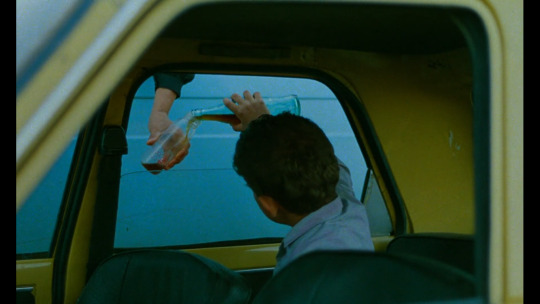

Life, and Nothing More. Abbas Kiarostami. 1992
#life and nothing more#koker trilogy#abbas kiarostami#iranian cinema#90s#1990s#cinema#film#documentary#movies#art
2K notes
·
View notes
Text
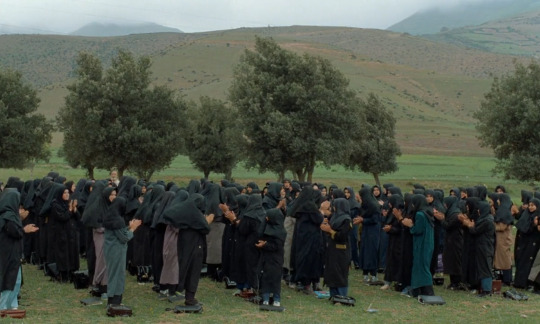



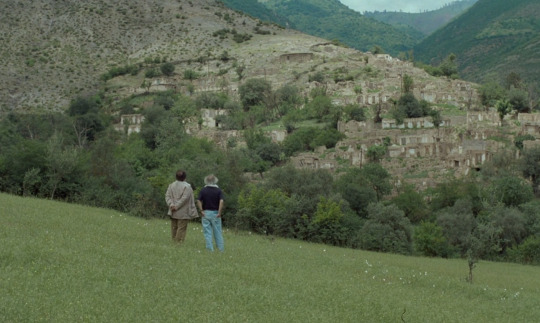



Through the Olive Trees (1994) dir. Abbas Kiarostami
#through the olive trees#koker trilogy#abbas kiarostami#where is the friend's home#life and nothing more#zir-e derakhtan-e zaytun#under the olive trees#and life goes on#iran#iranian cinema#1990s#vintage#cinema#movie stills#film#movie#cinephile#1990s films#cinematography#criterion collection#iranian films#film stills#90s#iranian movie#asian cinema#asian movie#asian film#destiny's rainboww
115 notes
·
View notes
Text
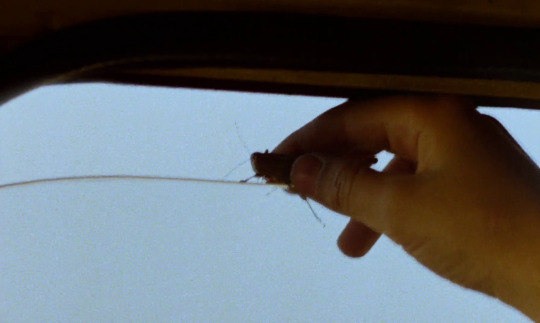
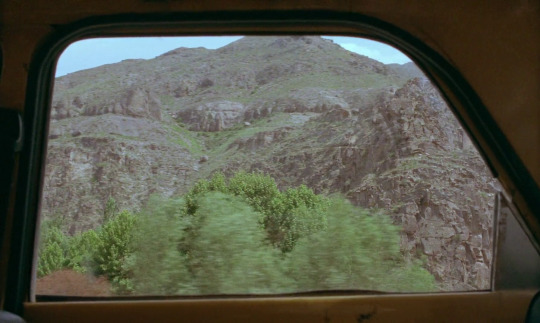

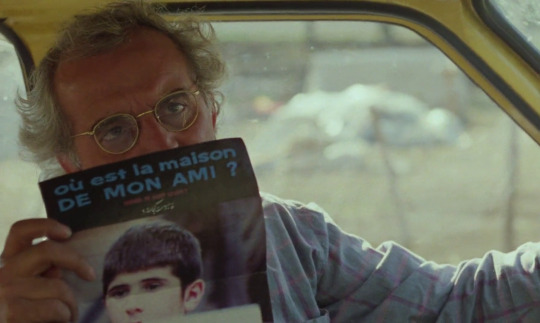
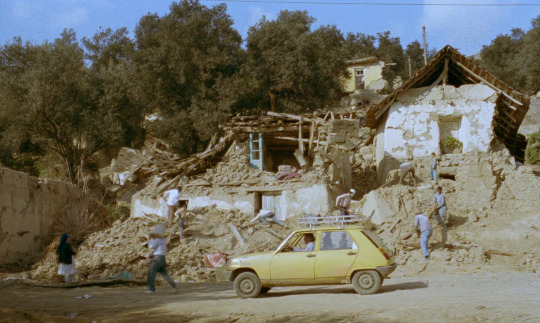




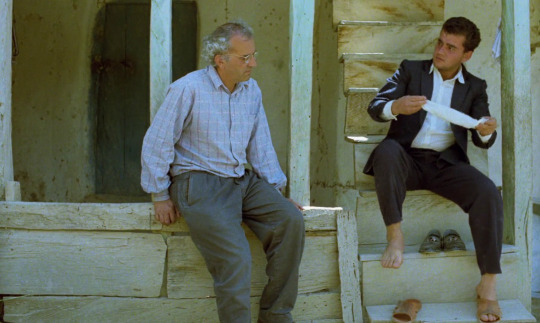
E a Vida Continua (1992)
Abbas Kiarostami
31 notes
·
View notes
Text
Abbas Kiarostami and the similarities between filmmaking to football: “Arbitrary choices”

(Credit: Hossein Esmaeili)
Swapnil Dhruv Bose Thu 22 August 2024 22:30, UK
The Iranian New Wave had a monumental impact on the way directors around the world approached their craft, propelled by the efforts of pioneering filmmakers such as Dariush Mehrjui and Mohsen Makhmalbaf, who completely changed the game. However, the movement wouldn’t have been the same without the efforts of one particular auteur: Abbas Kiarostami.
Known for his unique incorporation of documentary stylisations and fictional elements in his cinematic vision, Kiarostami played a significant part in redefining realism in Iranian cinema. Through masterpieces such as Close-Up, he used reality as a mere foundation upon which he based his dizzyingly complex investigations of the medium itself.
This tendency to use the lens of cinema to transform reality into something that is recognisable yet strange is also evident in his acclaimed Koker trilogy. Starting with a simple but moving story about the innocence of friendship in Where Is the Friend’s Home?, Kiarostami eventually ventured into metafictional explorations following an earthquake that left the region severely damaged in 1990. It’s these oscillations between fiction and facts that define Kiarostami’s singular voice, establishing a new form of cinematic truth.
In a conversation with Filmmaker, the Iranian auteur was once asked about the unique narrative structures that he employs in his works and whether they really represent a totality within the context of the storytelling. Interestingly, the Close-Up director compared his approach to filmmaking to a game of football, claiming that the fundamental principles that govern his narratives are rooted in both randomness and responsibility.
Kiarostami explained: “The starting point and the ending point are nothing but two arbitrary choices. You make them as in soccer games, where they chose that it’s 90 minutes, not less and not more. They’re arbitrary, but I guess it’s based on the attention span of viewers, of soccer games and of movies. But the choices are the responsibility of the filmmaker. You have to choose to join the story at an arbitrary point, and you leave it at an arbitrary point.”
Elaborating on his point, the Iranian filmmaker added: “As long as I take the responsibility of the choice, I have to make the choice that is as right as possible. Of the hundreds of points to enter and exit that are offered to me, I have to choose the one that I feel is the least wrong, the least fake. It is fake, it is a moment that I choose to erupt the story, but I make it as smooth as I can. What enables me to do it is the skill of filmmaking.”
It’s a fascinating perspective which accurately describes the nuanced way in which Kiarostami viewed the rigid lenses of realism. The finest example of this is his 1997 opus Taste of Cherry, following the efforts of a man who drives looking for someone to bury him after he finally gathers the courage to kill himself. While some who haven’t seen the film might expect that death would bring the narrative to its natural end, Kiarostami subverts all expectations by breaking the fourth wall and revealing the fundamental fiction of cinema.
2 notes
·
View notes
Text



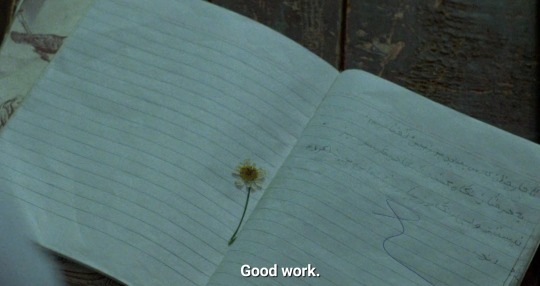
Where Is the Friend's Home?(1987), dir. Abbas Kiarostami
(1st part of Koker Trilogy)
#cinema#drama#family#koker trilogy#koker#part one#art#friends#abbas kiarostami#persian#persian language#cinemetography#where is the friend's home
54 notes
·
View notes
Photo
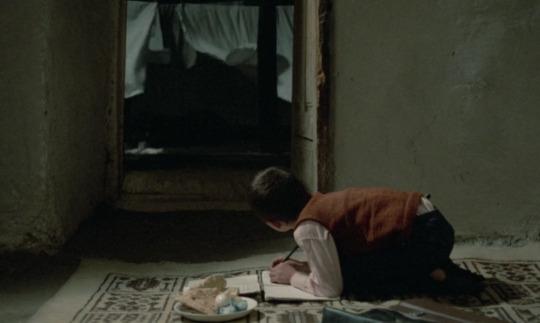
Abbas Kiarostami, Khane-ye dust kojast, 1987
#film#abbas kiarostami#Khane-ye dust kojast#where is the friend's home?#Farhad Saba#koker trilogy#iranian cinema#80s#film still
4 notes
·
View notes